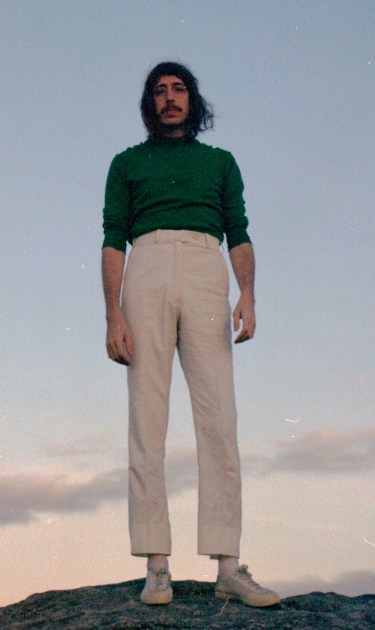To Brazilian singer, songwriter, and producer Tim Bernardes, one thing does not necessarily have to end for another one to begin, and this especially applies to his musical endeavors. In his eighth year as a lead vocalist of the alt-rock band O Terno in 2017, he released his first solo album Recomeçar (“begin again” in Portuguese). He is now back to focusing on his solo work, releasing Mil Coisas Invisíveis earlier this summer.
As the frontman of O Terno, Bernardes cemented the band’s identity through his orchestra-oriented take on 1960s Brazilian pop and rock songwriting style and lyrics capturing the millennial zeitgeist. To this date, O Terno has released four albums, and Bernardes was involved in nearly everything from music to video production. However, he still had creativity left for individual projects. O Terno’s Atrás/Além came out in 2019 between his solo projects, making it clear that though he’s focusing on his own music, the band has officially not split.
Released in June 2022, Bernades’ Mil Coisas Invisíveis is considerably happier than Recomeçar, but is as equally introspective as his first solo album and is similarly permeated with big questions. “Political things merge with the emotions I’m experiencing. It’s more about how I feel when observing these things and how the topics mix up in my mind — and probably in everybody’s too — in a non-linear way,” Bernades tells Remezcla.
Bernardes’ philosophy is that of an intellectual, but the calm naturality with which he talks takes a bit of the weight off. Something similar is reflected in his music — it is profound yet not hard to digest. His melodies have a spoken-word style, and his conceptual inspirations aren’t always flashy. However, these influences are present even in his simplest lyrics, such as when he nostalgically quotes his grandmother in “A balada de Tim Bernardes”: “Go, son, find a way to be right here what you dream of.” It’s a simple, loving way to synthesize Bernardes’ wish for uniting reality with dreams and hopes — the here-and-now with the beyond.

Like many artists during the pandemic, Bernardes’ forced solitude is reflected in his music. “With the pandemic, it became clear to me that life is [a product of] our co-authorship with the universe,” he says. The songs he created during this time, and even those he started writing before the pandemic, had a clear intention: to provide a sense of calm for the disquietude that is symbolic of today’s fast-paced world.
Despite the calm Bernardes wants to provide with his music, there’s a hectic aspect to his work. A wide range of musical skills and a comprehensive view of music-making seems like the perfect combo to create a multitasker. And, indeed, he is one. For example, he worked on every creative and technical aspect of Mil Coisas Invisíveis. Not that it was a burden — Bernardes enjoys the freedom and control over each part of the bigger picture. “I choose words just like I choose the sound of the microphone, the violin arrangements, the mixing of the echoes. Even the parts that are often seen as technical are under a creative umbrella,” he notes.
“I choose words just like I choose the sound of the microphone, the violin arrangements, the mixing of the echoes. Even the parts that are often seen as technical are under a creative umbrella.”
Bernardes’ holistic method has a strategy. When he’s producing, it’s all planned to convey specific sensations. He identifies himself as a “composer of the whole thing: not just of the lyrics, music, or arrangement.” Mil Coisas Invisíveis is full of metaphors, but he also explicitly references his life and the world we live in. Nevertheless, these lyrics are suggestive of a transcendental intent, even if not necessarily in an esoteric or religious way.

These are but a few of the thousand otherworldly things that inspire Bernardes. “The concrete and the abstract complement each other. The rationalist, materialist view of the whole is a kind of delusion of modern positivism,” he says, referring to the system coined by philosopher Auguste Comte, which prioritizes logic and science rather than any metaphysical feeling or belief.
Bernardes’ music holds a ton of idiosyncrasy. But he also wonders where he stands in the lineage of genres, traditions, and musical environments he engages with, whether directly or by influence. In “Mistificar,” he sings, “I do believe in Beatles” as a contraposition to John Lennon’s “God,” where he declares, “I don’t believe in Beatles.” It’s Bernardes’ way of inserting himself into a timeline of music that he doesn’t belong to but that speaks to him and, consequently, through him for newer generations.
To what extent Bernardes connects the contemporary indie music scene with the tradition of the 1960s and 1970s song style used to be a theoretical question for him. But he says he’s excited and curious to now have the chance to experience it in person, as 2022 marks a groundbreaking year for his international career. Bernardes is currently on tour through the U.S, Europe, and Brazil.

Paraphrasing the lyrics of “Meus 26” from Mil Coisas Invisíveis, his current journey is his chance to show Brazil to the world. But also show Brazil the world.




